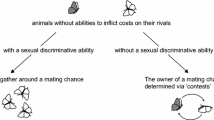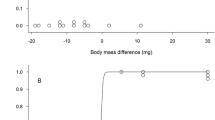Abstract.
The males of many butterfly species compete via pair-wise intrasexual contests, yet lack any obvious morphological traits conventionally associated with animal aggression. The evolution of contest behavior in this group is therefore interesting because the means by which individuals are able to inflict costs upon each other during combat are unclear. Here we review the relevant empirical information within a game-theoretical context in order to analyze contest-related costs and mechanisms of dispute settlement. Territorial butterfly contests carry obvious role asymmetries, and individuals in the 'resident' role are more likely to win across all studied species. We use this phenomenon as a framework for gaining further insight into the evolution of contest settlement in this group. Four principal hypotheses are evaluated: (1) that residency is used as an arbitrary convention, (2) that residents stand to gain a greater payoff if successful, (3) that residency bestows higher resource-holding potential (RHP) on males in that role, and (4) that residents are males of intrinsically higher RHP. We found most support for the latter explanation (the 'superior-competitor' hypothesis), partly because the alternatives require a restrictive set of ecological conditions, but also due to positive support for the idea of intrinsic RHP. The strongest evidence is provided by species in which repeated interactions (between the same individuals) always have the same outcome, regardless of changes in residency status. However, we also found a consistent effect on contest duration due to apparent 'confusion over residency,' which suggests a conventional element to contest behavior. Although butterfly contests must be costly in some way, the literature provides limited insight into how costs accrue, and hence the determinants of contest RHP remain obscure. We suggest that careful experimentation, using 'natural' manipulations where possible, should prove most beneficial in identifying costs and exploring schedules of contest settlement in this group. Moreover, future investigations should be sensitive to the fact that butterfly territoriality and associated male-male interactions are seated within a broader ecological and life-historical context.
Similar content being viewed by others

Author information
Authors and Affiliations
Additional information
Electronic Publication
Rights and permissions
About this article
Cite this article
Kemp, D., Wiklund, C. Fighting without weaponry: a review of male-male contest competition in butterflies. Behav Ecol Sociobiol 49, 429–442 (2001). https://doi.org/10.1007/s002650100318
Received:
Revised:
Accepted:
Issue Date:
DOI: https://doi.org/10.1007/s002650100318



